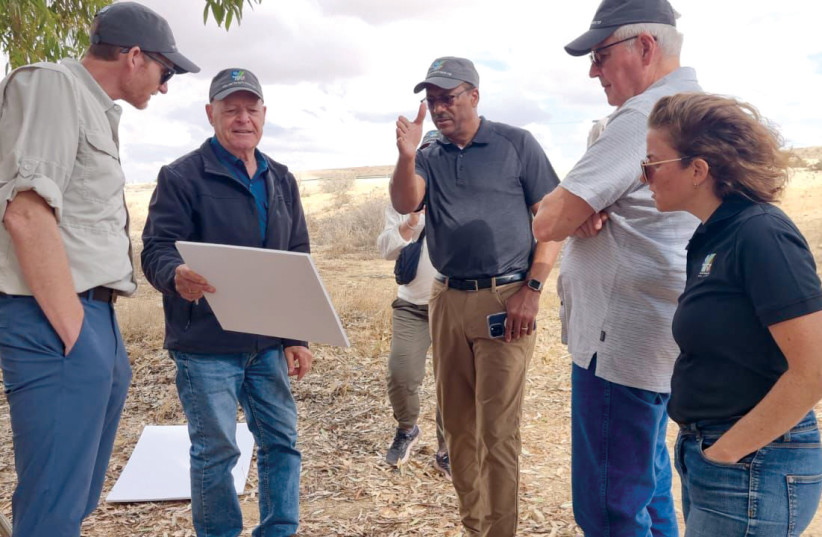The chief of the US Department of Agriculture’s Forest Service says that world leaders must recognize the changes that are happening in the environment and proactively develop ways to address them.
Randy Moore – the first African American to serve in his role – was in Israel the week of November 6 to discuss stepping up collaboration on forest research and preservation with Israel’s KKL-JNF. The visit took place during the United Nations Climate Change Conference, COP27, which was held in Egypt. Moore also visited Jordan and the Palestinian Authority.
In his role, Moore oversees around 30,000 permanent employees and 70,000 contract workers who sustainably manage 193 acres of national forests and grasslands, he confirmed in an interview with The Jerusalem Report.
Israel’s KKL has been cooperating with the American Forest Service for 35 years, and with Moore since he took up his post in the summer of 2021.
“KKL and USFS have a very fruitful collaboration, and we have learned a lot from them.”
Gilad Ostrovsky
“KKL and USFS have a very fruitful collaboration, and we have learned a lot from them,” said Gilad Ostrovsky, KKL-JNF’s chief forester.
He noted that there are some programs KKL-JNF and USFS used to collaborate on that this visit should help to resume, such as workshops and seminars on specific issues and sending Israeli foresters for one-year internships to the United States.

Moore told The Jerusalem Report that while some people disagree about the phrase “climate change,” there is no disagreement that something is shifting in our environment.
“We can clearly see the long-term shifts in temperature and weather patterns, whether we agree that it is a natural occurrence or man-caused,” Moore said. “We need to take advantage of the time we have now to take action.”
During his trip, he traveled from southern to northern Israel, exploring various forests and meeting with US Ambassador to Israel Tom Nides and KKL-JNF’s CEO, Avraham Duvdevani. He spent time in Ramat Raziel near Jerusalem, exploring the work the organization has done to preserve and expand Israel’s forests.
“I am completely impressed with the work that Israel has done over the last 100 years, planting around 250 million trees, to create a forest where there was not a forest,” said Moore.
He noted that what is especially noteworthy is KKL-JNF’s research into what will come next for Israel’s forests, since unlike in natural forests in which there is natural regeneration, Israel may not see this occur. Natural regeneration is when new plants and other greenery naturally replace plants that have died or been killed.
“Ideally, you would have a natural regeneration of forests; where vegetation grows up, it drops seeds, new trees grow from those seeds being dropped or being carried by the birds and animals. You don’t have that natural type of environment here, since this was not a natural area for trees, so the research that KKL-JNF is beginning to discover is going to be really telling for Israel. I am really hopeful,” Moore said. “I saw a lot of passion and commitment from KKL, so I am optimistic.”
This was Moore’s first trip to Israel. He said that he came “not expecting anything” but rather “to observe.”
“Coming without any perceived bias has allowed me to look at what Israel has been able to accomplish with the resources they have, and I have been very impressed,” Moore said.
‘Moving in the right direction’
Moore took over his agency at a time when it was struggling under pressure from some of the country’s worst forest fires in history. In 2021, some 58,733 fires burned 7,139,713 acres of forest, according to the National Interagency Fire Center.
In California, the second-largest wildfire in history, known as the Dixie wildfire, burned more than 963,000 acres. These forest fires are a result of climate change in general and extreme droughts specifically, Moore explained.
Moore has been a strong advocate not only for increasing manpower to help suppress these types of forest fires but also rolling out fuel treatments to slow their progress. This could include thinning, pruning, chipping or mechanically removing fuels.
“We have to do a lot more forest treatment so we have healthy, resilient forests,” Moore said.
He told the Report that despite some of the tragic results of these forest fires, they have given the country the opportunity to reforest some of the trees and to even increase trees in some cases. The fires are also a catalyst for updating and upgrading American nurseries so foresters have the right plants to put in the ground.
The 2021 Replant Act will infuse billions of dollars toward planting 1.2 billion trees over the next decade. In addition, Congress passed an infrastructure package with funding for fire prevention work. And finally, the Inflation Reduction Act – the largest single climate investment in US history – includes nearly $38 billion for agricultural conservation, agricultural credits, renewable energy, rural development and forestry.
“We are moving in the right direction,” Moore said. “These challenges have created opportunities, and we are developing a strategy.”
“We are happy that Randy Moore came to Israel,” Ostrovsky said. “We surely have a lot to learn together, especially in regard to climate change.” ■
